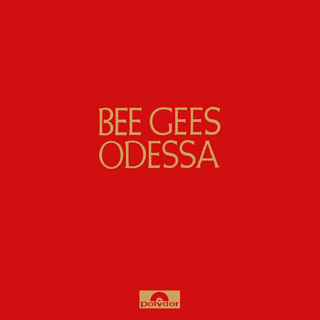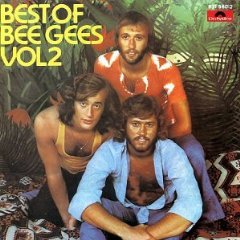
The Bee Gees were a musical group formed in 1958 by brothers Barry, Robin, and Maurice Gibb. The trio were especially successful in popular music in the late 1960s and early 1970s, and later as prominent performers in the disco music era in the mid- to late 1970s. The group sang recognisable three-part tight harmonies: Robin's clear vibrato lead vocals were a hallmark of their earlier hits, while Barry's R&B falsetto became their signature sound during the mid- to late 1970s and 1980s. The group wrote all their own original material, as well as writing and producing several major hits for other artists, and are regarded as one of the most important and influential acts in pop-music history. They have been referred to in the media as The Disco Kings, Britain's First Family of Harmony, and The Kings of Dance Music.

Saturday Night Fever is the soundtrack album from the 1977 film Saturday Night Fever starring John Travolta. The soundtrack was released on November 15, 1977 by RSO Records. Prior to the release of Thriller by Michael Jackson, Saturday Night Fever was the best-selling album in music history, and still ranks among the best-selling soundtrack albums worldwide, with sales figures of over 40 million copies.

One Night Only is a live album and DVD/Blu-ray by the Bee Gees. It features the group's concert at the MGM Grand in Las Vegas in 1997 and includes many of their greatest hits.

The Very Best of the Bee Gees is a greatest hits album by the Bee Gees. It was originally released in November 1990 by Polydor Records, around the time as the Tales from the Brothers Gibb box set. The album was primarily aimed at the European market, as shown by the exclusion of the US hits "Holiday", "I Started a Joke", "Lonely Days", "How Can You Mend a Broken Heart" and "Fanny ".

Best of Bee Gees is a 1969 compilation album by the English-Australian rock band Bee Gees. It was their first international greatest hits album. It featured their singles from 1966–1969 with the exception of the band's 1968 single "Jumbo".

Odessa is the sixth studio album by the Bee Gees, a double vinyl LP released in February 1969, initially in an opulent red flocked cover with gold lettering. Despite reaching the UK Top Ten and the US Top 20, the album was not particularly well-received, though now is regarded by many as the most significant of the group's Sixties albums. An ambitious project, originally intended as a concept album on the loss of a fictional ship in 1899, it created tension and disagreements in the band regarding the work's direction; finally, a dispute over which song to release as a single led to Robin Gibb temporarily leaving the group.

Size Isn't Everything is the twentieth studio album by the Bee Gees, released in the UK on 13 September 1993, and the US on 2 November of the same year. The brothers abandoned the contemporary dance feel of the previous album High Civilization and went for what they would describe as "A return to our sound before Saturday Night Fever".

"Night Fever" is a song written and performed by the Bee Gees. It first appeared on the soundtrack to Saturday Night Fever on RSO Records. Producer Robert Stigwood wanted to call the film Saturday Night, but singer Robin Gibb expressed hesitation at the title. Stigwood liked the title Night Fever but was wary of marketing a movie with that name. The song bounded up the Billboard charts while the Bee Gees’ two previous hits from Saturday Night Fever soundtrack were still in the top ten. The record debuted on the Billboard Hot 100 Chart at #76, then leaped up 44 positions to #32. It then moved: 32–17–8–5–2–1. It remained at #1 for eight weeks, and ultimately spent 13 weeks in the top 10. For the first five weeks that "Night Fever" was at #1, "Stayin' Alive" was at #2. Also, for one week in March, Bee Gees related songs held five of the top positions on the Hot 100 chart, and more impressively, four of the top five positions, with "Night Fever" at the top of the list. The B-side of "Night Fever" was a live version of "Down the Road" taken from the Bee Gees 1977 album, Here at Last... Bee Gees... Live.

Spirits Having Flown is the fifteenth album released by the Bee Gees. It was the group's first album after their collaboration on the Saturday Night Fever soundtrack. The album's first three tracks were released as singles and all reached No. 1 in the US, giving the Bee Gees an unbroken run of six US chart-toppers in a one-year period and equaling a feat shared by Bing Crosby, Elvis Presley, and The Beatles. It was the first Bee Gees album to make the UK top 40 in ten years, as well as being their first and only UK No. 1 album. Spirits Having Flown also topped the charts in Australia, Canada, Germany, New Zealand, Sweden and the US. The album has sold more than 30 million copies worldwide, making it one of the best-selling albums of all time.

The Marbles were an English rock duo that consisted of Graham Bonnet and Trevor Gordon, who operated between 1968 and 1969. Their only well-known singles were "Only One Woman" and "The Walls Fell Down". They also became associated with the Bee Gees members Barry, Robin and Maurice Gibb at that time.

Their Greatest Hits: The Record is the career retrospective greatest hits album by the Bee Gees, released on UTV Records and Polydor in November 2001 as HDCD. The album includes 40 tracks spanning over 35 years of music. Four of the songs were new recordings of classic Gibb compositions originally recorded by other artists, including "Emotion", "Heartbreaker", "Islands in the Stream", and "Immortality". It also features the Barry Gibb duet with Barbra Streisand, "Guilty", which originally appeared on Streisand's 1980 album of the same name. It is currently out of print and has been supplanted by another compilation, The Ultimate Bee Gees.

Living Eyes is the Bee Gees' sixteenth original album, released in 1981. It was the band's final album on RSO Records, which would be absorbed into Polydor and subsequently discontinued. The album showcased a soft rock sound that contrasted with their disco and R&B material of the mid-to-late 1970s; having become a prominent target of the popular backlash against disco, the Bee Gees were pressured to publicly disassociate from the genre.

One is the Bee Gees' eighteenth studio album, released in April 1989.
"If I Can't Have You" is a disco song written by the Bee Gees in 1977. The song initially appeared on the Saturday Night Fever soundtrack in a version by Yvonne Elliman, released in November 1977. The Bee Gees' own version appeared a month later as the B-side of "Stayin' Alive".

Best of Bee Gees Vol. 2 is a compilation album of hits by the Bee Gees released in 1973. The album, briefly revived on CD in the late 1980s, went out of print, but was reissued by Rhino in November 2008.

Bee Gees' 1st is the third studio album by the Bee Gees, and their first international full-length recording after two albums distributed only in Australia and New Zealand. Bee Gees' 1st was the group's debut album for the UK Polydor label, and for the US Atco label. Bee Gees 1st was released on 14 July 1967 in the UK. On 9 August it entered the UK charts; on that same day, the album was released in the US, and it entered the US charts on 26 August.

Here at Last... Bee Gees... Live is the first live album by the Bee Gees. It was recorded on December 20, 1976 at the LA Forum and was released in May 1977 by RSO Records. It reached No. 8 in the US, No. 8 in Australia, No. 1 in New Zealand and No. 2 in Spain.
"I Can't See Nobody" is a song by the Bee Gees, released first as the B-side of "New York Mining Disaster 1941". With "New York Mining Disaster 1941", this song was issued as a double A in Germany and Japan, and included on the group's third LP, Bee Gees' 1st. "I Can't See Nobody" charted for one week at number 128 on the Billboard Bubbling Under the Hot 100 in July 1967.

Mythology is a box set compilation of recordings by the Gibb brothers, mostly performed as the Bee Gees, arranged in a four disc set each highlighting a Gibb brother. Barry and Robin chose their own songs, with Maurice's songs selected by his widow Yvonne and Andy's songs selected by his daughter Peta. Several U.S. and U.K. hits are absent from this collection including "Lonely Days", "How Can You Mend a Broken Heart", "You Should Be Dancing", "Nights on Broadway", "World" and "One".

Timeless: The All-Time Greatest Hits is a compilation album by the Bee Gees. It was released on 21 April 2017 by Capitol Records to coincide with the 40th anniversary of the Saturday Night Fever soundtrack. The album is a single-disc compilation of the group's biggest hits selected by the group's last surviving member, Barry Gibb. Gibb said of the compilation: "Although there are many other songs, these songs, I feel, are the songs that Maurice, Robin, and I would be most proud of."


















